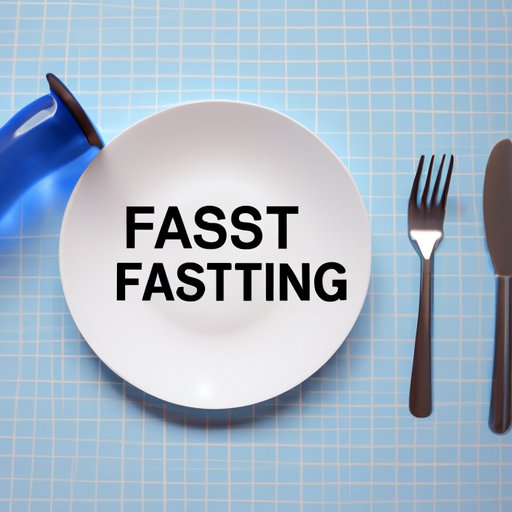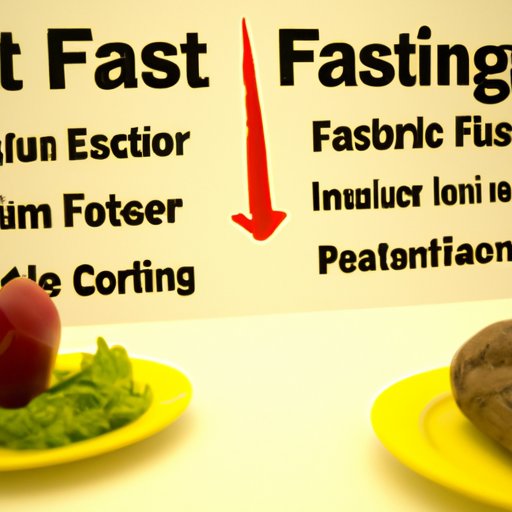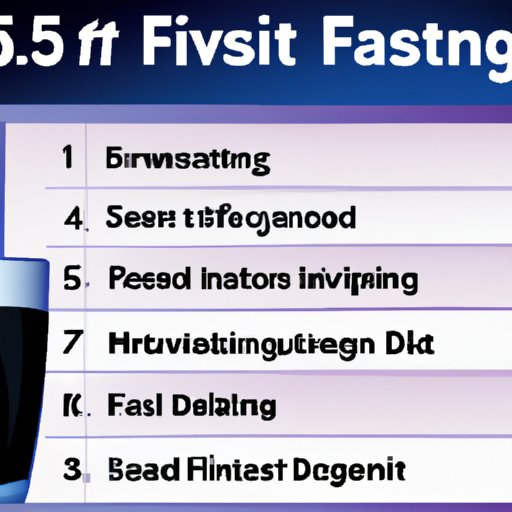Introduction
Fasting has become an increasingly popular practice for those looking to improve their health and wellness. While there are numerous potential benefits associated with fasting, it is important to understand the risks involved as well. In this article, we will explore the benefits and risks of different types of fasting regimens, in order to help you make an informed decision about whether fasting is right for you.
Examining the Benefits and Risks of Intermittent Fasting
Intermittent fasting is a type of fasting regimen in which people fast for short periods of time, usually between 12 and 16 hours per day. There are several potential benefits associated with intermittent fasting, including weight loss, improved metabolism, and reduced risk of diabetes. However, there are also some risks associated with this type of fasting, such as dehydration, nutritional deficiencies, and low energy levels.
Benefits of Intermittent Fasting
Studies have shown that intermittent fasting can have a number of positive health benefits. Here are a few of the potential benefits associated with this type of fasting:
- Weight Loss: Studies have found that intermittent fasting can lead to significant weight loss, particularly when combined with a healthy diet and exercise program. One study published in the British Journal of Nutrition found that participants who followed an intermittent fasting regimen for 8 weeks lost an average of 8.5 pounds (3.9 kg) more than those who did not fast.
- Improved Metabolism: Intermittent fasting has been shown to improve metabolic health by increasing the body’s sensitivity to insulin. This can help to reduce the risk of developing type 2 diabetes and other chronic diseases. A study published in the journal Cell Metabolism found that participants who followed an intermittent fasting regimen for 12 weeks had significantly lower blood sugar levels than those who did not fast.
- Reduced Risk of Diabetes: Research has found that intermittent fasting can help to reduce the risk of type 2 diabetes. A study published in the journal Diabetologia found that participants who followed an intermittent fasting regimen for 12 weeks had improved insulin sensitivity and reduced fasting glucose levels, compared to those who did not fast.
Risks of Intermittent Fasting
While there are many potential benefits associated with intermittent fasting, there are also some potential risks. Here are a few of the potential risks associated with this type of fasting:
- Dehydration: During periods of fasting, it is important to stay hydrated in order to avoid dehydration. If you are fasting for long periods of time, be sure to drink plenty of water to keep your body properly hydrated.
- Nutritional Deficiencies: When following an intermittent fasting regimen, it is important to ensure that you are getting all the nutrients your body needs. If you are not consuming enough nutrient-dense foods during your eating windows, you may be at risk of developing nutritional deficiencies.
- Low Energy Levels: Intermittent fasting can cause fatigue and low energy levels due to the lack of food intake. If you find that your energy levels are consistently low while fasting, it is important to talk to your doctor to determine if there are any underlying medical conditions that could be causing this issue.
Exploring the Health Effects of Long-Term Fasting
In addition to intermittent fasting, there are also some potential benefits associated with long-term fasting, or fasting for several days or even weeks at a time. Here are a few of the potential benefits and risks associated with long-term fasting:
Benefits of Long-Term Fasting
Long-term fasting has been associated with a number of potential health benefits, including:
- Increased Autophagy: Autophagy is the process by which our cells break down and recycle old and damaged proteins and organelles. Studies have found that long-term fasting can increase autophagy, which can help to reduce inflammation and protect against age-related diseases.
- Lower Blood Pressure: Studies have found that long-term fasting can help to reduce blood pressure, which can help to reduce the risk of heart disease and stroke. A study published in the journal Circulation found that participants who fasted for 10 days had significantly lower systolic and diastolic blood pressure levels than those who did not fast.
- Reduced Inflammation: Long-term fasting has been shown to reduce inflammation, which can help to protect against chronic diseases such as diabetes, heart disease, and cancer. A study published in the journal Free Radical Biology and Medicine found that participants who fasted for 10 days had significantly lower levels of inflammatory markers than those who did not fast.
Risks of Long-Term Fasting
While there are potential benefits associated with long-term fasting, there are also some potential risks. Here are a few of the potential risks associated with this type of fasting:
- Malnutrition: Long-term fasting can lead to malnutrition due to the lack of food intake. For this reason, it is important to ensure that you are consuming adequate amounts of nutrient-dense foods during your eating windows.
- Fatigue: Long-term fasting can cause fatigue due to the lack of food intake. If you experience persistent fatigue while fasting, it is important to talk to your doctor to determine if there are any underlying medical conditions that could be causing this issue.
- Hormonal Imbalances: Long-term fasting can cause hormonal imbalances due to the lack of food intake. If you experience persistent hormonal imbalances while fasting, it is important to talk to your doctor to determine if there are any underlying medical conditions that could be causing this issue.

Investigating the Potential Advantages of Fasting for Weight Loss
In addition to potential health benefits, fasting has also been associated with weight loss. Here are a few of the potential mechanisms by which fasting can promote weight loss:
Mechanisms by which Fasting Promotes Weight Loss
- Reduced Calorie Intake: Fasting can help to reduce calorie intake by limiting the amount of time during which you can eat. By reducing your calorie intake, you can create a caloric deficit, which can lead to weight loss.
- Increased Metabolism: Fasting has been shown to increase metabolic rate, which can help to burn more calories and promote weight loss. A study published in the journal Obesity found that participants who followed an intermittent fasting regimen for 12 weeks had significantly higher resting metabolic rates than those who did not fast.
- Improved Insulin Sensitivity: Fasting has been shown to improve insulin sensitivity, which can help to reduce fat storage and promote weight loss. A study published in the journal Diabetes Care found that participants who followed an intermittent fasting regimen for 12 weeks had significantly improved insulin sensitivity, compared to those who did not fast.
Potential Side Effects of Fasting for Weight Loss
While fasting can be an effective tool for weight loss, there are some potential side effects associated with this practice. Here are a few of the potential side effects of fasting for weight loss:
- Muscle Loss: Fasting can lead to muscle loss due to the lack of food intake. To minimize muscle loss while fasting, be sure to consume adequate amounts of protein-rich foods during your eating windows.
- Gallstone Formation: Fasting can increase the risk of gallstone formation due to the rapid reduction in calorie intake. To reduce the risk of gallstones, be sure to drink plenty of water and consume a balanced diet while fasting.
- Compromised Immune System: Fasting can compromise the immune system due to the lack of food intake. To minimize this risk, be sure to consume adequate amounts of immune-boosting foods such as fruits and vegetables while fasting.

Analyzing the Pros and Cons of Different Types of Fasting Regimens
There are a variety of different types of fasting regimens available, each with its own set of pros and cons. Here are a few of the most popular types of fasting, along with their potential advantages and disadvantages:
Popular Types of Fasting
- Intermittent Fasting: Intermittent fasting is a type of fasting regimen in which people fast for short periods of time, usually between 12 and 16 hours per day.
- Alternate Day Fasting: Alternate day fasting is a type of fasting regimen in which people fast one day and eat normally the next day.
- 5:2 Diet: The 5:2 diet is a type of fasting regimen in which people eat normally five days per week and fast two days per week.
Pros and Cons of Different Types of Fasting
- Intermittent Fasting: Intermittent fasting is a relatively easy fasting regimen to follow and can be beneficial for weight loss and overall health. However, it can be difficult to stick to and can cause dehydration, nutritional deficiencies, and low energy levels if not done properly.
- Alternate Day Fasting: Alternate day fasting can be an effective weight loss tool and can also help to improve metabolic health. However, it can be difficult to stick to and can cause fatigue and low energy levels if not done properly.
- 5:2 Diet: The 5:2 diet is a relatively easy fasting regimen to follow and can be beneficial for weight loss and overall health. However, it can be difficult to stick to and can cause dehydration, nutritional deficiencies, and low energy levels if not done properly.
Conclusion
Fasting can be an effective tool for improving health and promoting weight loss. However, it is important to understand the potential benefits and risks associated with different types of fasting regimens in order to ensure that you are making the best decisions for your health. In general, it is recommended that you consult with a healthcare professional before starting any type of fasting regimen to ensure that it is safe for you.
Overall, fasting can have a number of potential benefits, including weight loss, improved metabolism, and reduced risk of diabetes. However, it is important to understand the potential risks associated with fasting, such as dehydration, nutritional deficiencies, and low energy levels. Additionally, it is important to choose the right type of fasting regimen for your individual needs and goals. By following these recommendations, you can ensure that you are practicing healthy fasting habits.
(Note: Is this article not meeting your expectations? Do you have knowledge or insights to share? Unlock new opportunities and expand your reach by joining our authors team. Click Registration to join us and share your expertise with our readers.)
